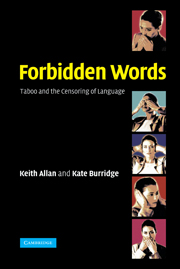Book contents
- Frontmatter
- Contents
- List of figures
- Acknowledgements
- 1 Taboos and their origins
- 2 Sweet talking and offensive language
- 3 Bad language? Jargon, slang, swearing and insult
- 4 The language of political correctness
- 5 Linguistic purism and verbal hygiene
- 6 Taboo, naming and addressing
- 7 Sex and bodily effluvia
- 8 Food and smell
- 9 Disease, death and killing
- 10 Taboo, censoring and the human brain
- Notes
- References
- Index
2 - Sweet talking and offensive language
Published online by Cambridge University Press: 03 December 2009
- Frontmatter
- Contents
- List of figures
- Acknowledgements
- 1 Taboos and their origins
- 2 Sweet talking and offensive language
- 3 Bad language? Jargon, slang, swearing and insult
- 4 The language of political correctness
- 5 Linguistic purism and verbal hygiene
- 6 Taboo, naming and addressing
- 7 Sex and bodily effluvia
- 8 Food and smell
- 9 Disease, death and killing
- 10 Taboo, censoring and the human brain
- Notes
- References
- Index
Summary
Discussion of taboo and the censoring of language naturally leads to a consideration of politeness and impoliteness, and their interaction with euphemism (sweet talking), dysphemism (speaking offensively) and orthophemism (straight talking). The term euphemism (Greek eu ‘good, well’ and phēmē ‘speaking’) is well known; but its counterpart dysphemism (Greek dys- ‘bad, unfavourable’) rarely appears in ordinary language. Orthophemism (Greek ortho- ‘proper, straight, normal’, cf. orthodox) is a term we have coined in order to account for direct or neutral expressions that are not sweet-sounding, evasive or overly polite (euphemistic), nor harsh, blunt or offensive (dysphemistic). For convenience, we have also created the collective term X-phemism to refer to the union set of euphemisms, orthophemisms and dysphemisms. Important to this discussion is the concept of cross-varietal synonymy, i.e. words that have the same meaning as other words used in different contexts. For instance, the X-phemisms poo, shit and faeces are cross-varietal synonyms because they denote the same thing but have different connotations, which mark different styles used in different circumstances. We also examine the criteria for words being labelled ‘dirty’ and explain why it is that, where a word has a taboo homonym, the polite sense is usually censored out. Although we focus on English, other languages behave in a similar way.
Politeness
Every polite tongue has its own rules.
(Murray 1824: 174)To broach the subject of polite terms for impolite topics we need to establish some ground rules on politeness.
- Type
- Chapter
- Information
- Forbidden WordsTaboo and the Censoring of Language, pp. 29 - 54Publisher: Cambridge University PressPrint publication year: 2006



